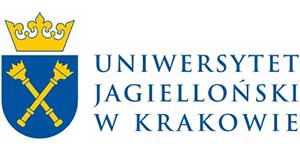PROJECT
PARTNER
The Jagiellonian University is the oldest higher education institution in Poland and one of the oldest in Europe. It was founded on 12 May 1364 by the Polish king Casimir the Great. The Jubilee year 2014 marked the 650th anniversary of this remarkable event. Today, the Jagiellonian University comprises 16 Faculties, where nearly 4 thousand academic staff conduct research and provide education to over 40 thousand students, within the framework of more than 80 different fields of study.
The eminent researchers and state-of-the-art infrastructure make the JU one of the leading Polish scientific institutions, collaborating with major academic centres from all over the world. The Jagiellonian University is also home to about 150 student societies, where young researchers pursue their academic interests and develop friendships with people who share their passion. The university’s prestige in both Poland and abroad is illustrated by its widely recognised research achievements.
The scientists and physicians from the JU Medical College carry out pioneer studies, e.g. in cardiac surgery, urology and neurology, often leading to the development of novel treatment methods. Their findings have been published in some of the most prestigious international journals, for instance European Journal of Cardio-Thoracic Medicine, New England Journal of Medicine, and Lancet. JU archaeologists explore the secrets of ancient sites in various parts of the world, including Egypt, Cyprus, Central America, South Asia and Altay. The astronomers take part in the most important international projects in their field, including H.E.S.S. and VIPERS, whereas the results of research by JU biotechnologists have been published in such reputable specialist journals as Bioorganic and Medicinal Chemistry, Molecular Ecology Resources or European Journal of Human Genetics.
These are only some examples of remarkable successes for which the Jagiellonian University has been famous in recent years. The current position of the JU is also reflected in the growing number of patent applications and patents – in the year 2017 alone, there were as many as 55 patents granted to its academic staff members. Unsurprisingly, the Jagiellonian University staff have been honoured with a number of prestigious distinctions and awards, including the elite awards of the Foundation for Polish Science (‘Polish Nobel Prizes’) bestowed upon JU professors: Jan Woleński, Tomasz Guzik, and Jan Potempa during the years 2010–2013. Additionally, the University was also recognised by the international databases Web of Science and Elsevier Scopus as possessing the most prolific researchers in Poland, publishing the most academic papers. In 2018, it was the only Polish and Eastern European higher education institution in Reuter’s Top 100: Europe’s Most Innovative Universities ranking.
The most unique large-scale projects run by the Jagiellonian University include the Jagiellonian Centre for Experimental Therapeutics, Małopolska Centre for Biotechnology, OMICRON, and Synchrotron Radiation Centre ‘Solaris’.
Role in the Facilitate Project
As a Neurology Department at Jagiellonian University, we carry out a large number of clinical trials. We would like to bring a dose of a practical approach to the project (from the investigator and patient side).
The expertise in conducting clinical trial will support the development of clinical case analysis in WP3 (Ethics, standardization and regulatory framework)and supporting legal partners in WP2 (Legal and data privacy framework), validation of the PoC in WP5 (Technology framework and interoperability solutions) and providing stakeholder within own clinical networks in WP6 (Communication and dissemination).






